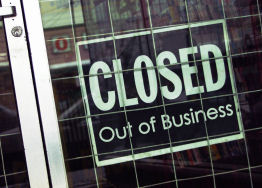 I go to great lengths to keep politics out of the blog—would rather focus on the things small business owners have first hand control over than invite the “aromatic waft” accompanying most political debate these days. This morning, however, Bob Schieffer (host, Face the Nation, CBS) delivered an editorial that really resonates in my brick-and-mortar lovin’ heart: [click here to continue…]
I go to great lengths to keep politics out of the blog—would rather focus on the things small business owners have first hand control over than invite the “aromatic waft” accompanying most political debate these days. This morning, however, Bob Schieffer (host, Face the Nation, CBS) delivered an editorial that really resonates in my brick-and-mortar lovin’ heart: [click here to continue…]
 This whole fee thing makes me nuts.
This whole fee thing makes me nuts.
First, banks charged merchants for every single card swipe (both credit and debit) at the register. Didn’t matter that debit cards were “safer” transactions since no extension of credit risk was involved. Businesses still paid full fare for both, on behalf of their customers.
Now that the Dodd Frank bill has been enacted, putting controls in place that limit skyrocketing swipe fees that hammer merchants, banks have begun looking in new directions for additional fees…consumers, and they’re hoppin’ mad.
(Yes, I appreciate the irony. When a merchant paid the fee on behalf of the customer, many consumers saw it as “the cost of doing business.” Now that banks ask customers to pick up part of their own tab, the bristling has begun.) [click here to continue…]
 Apparently, there’s yet another crazy idea floating around in Washington–and by “crazy,” I mean “no one has stopped to consider the ramifications of this on Main Street.” A bill recently introduced by Rep. David Schweikert (Ariz.) and Rep. Jeb Hensarling (Texas) is aimed at retiring the dollar bill.
Apparently, there’s yet another crazy idea floating around in Washington–and by “crazy,” I mean “no one has stopped to consider the ramifications of this on Main Street.” A bill recently introduced by Rep. David Schweikert (Ariz.) and Rep. Jeb Hensarling (Texas) is aimed at retiring the dollar bill.
Okay. At first glance, the math makes sense, given what paper currency costs to produce.
But.
When you think about it a moment longer, from a local brick and mortar’s point of view, a few glaring realities come to light: [click here to continue…]
 Independent business owners are often stunned upon learning about the plethora of financial incentives offered to big boxes by cities hoping to snag the next big supercenter. From deep property tax discounts to long term cash infusions to (in the most radical cases) negotiated sales tax payments, the rules are anything but consistent. Big guys get big deals; little guys pay full fare. [click here to continue…]
Independent business owners are often stunned upon learning about the plethora of financial incentives offered to big boxes by cities hoping to snag the next big supercenter. From deep property tax discounts to long term cash infusions to (in the most radical cases) negotiated sales tax payments, the rules are anything but consistent. Big guys get big deals; little guys pay full fare. [click here to continue…]
 This is the kind of stuff that makes my blood boil.
This is the kind of stuff that makes my blood boil.
The stationery industry has faced it for years—brides come in to touch, feel, and get professional advice while searching for wedding invitations, then take that valuable knowledge online, or worse, home as a DIY project.
The assumption that stores provide floor samples and professional advice for free is absurd; they pay for those samples, floor displays, and employee training, all for the purpose of making a sale. Using those resources with no intent of purchasing from the providing retailer is just this side of shoplifting. Yes, my language is strong on this point, but as a past retailer who watched the practice first hand, I know what it costs in very real financial terms.
A lot.
This past weekend, USA Today pushed the “use-em-and-leave-em” concept to the extreme, actually instructing consumers to peruse computers in local stores, then go online to make the purchase, complete with a list of online discounters happy to make the sale (on a brick and mortar’s back).
States are gasping for air as their sales tax revenues drop. Commercial property tax roles shrink as brick and mortars go dark. And our quality of life, directly connected to emergency services, sidewalks, streets, state agencies, school programs, park systems, etc. suffer.
I understand the high cost of outfitting kids for school. No question. But telling consumers it’s okay to “use” a local store’s resources with zero intent of making a purchase is just plain wrong.
Here’s the article—I hope retailers reading this will head on over there and add their two cents to the comments. Your voices need to be heard.
 I’m no fan of Groupon (as stated here previously), partly because of their say-one-thing-but-do-another approach, but mostly because of the financial downside their deals deliver for small business.
I’m no fan of Groupon (as stated here previously), partly because of their say-one-thing-but-do-another approach, but mostly because of the financial downside their deals deliver for small business.
Well, it seems the folks at Groupon may have let their bravado outpace their potential. Having turned down a $6 billion buyout offer from Google, they just created their worst nightmare–Google as a competitor, announced yesterday. Given the latter’s access to maps, apps, and about a bazillion local business listings through everything from Adword accounts to Local Search, well…it’s not like they’ll have to do the Upstart Scramble to get off the ground.
At the core, however, this still presents the same problem, different day: Small business owners reliant on physical inventory can’t make the numbers work on these below-wholesale discount offers. The math simply isn’t there, even if you factor in volume. [click here to continue…]
 According to a report on CNN, banks are considering limiting the amount of debit card transactions to a paltry $50 or $100? Well folks, if you want to ruin independent brick and mortars, that’s an effective way to do it. [click here to continue…]
According to a report on CNN, banks are considering limiting the amount of debit card transactions to a paltry $50 or $100? Well folks, if you want to ruin independent brick and mortars, that’s an effective way to do it. [click here to continue…]
 When “buy local”/”shop local” messaging hit its stride two years ago, big boxes and national chains quickly realized their corner on marketplace visibility was being eclipsed. Cost-conscious consumers were not only thinking about the price of an item, but the impact of where they purchased it. Before long, we saw mega-retailers repackaging the “buy local” message to include themselves—they’d procure broccoli from a nearby grower, then advertise themselves as part of the “local” movement. Carry meat packaged by a company located in a nearby town, then tell consumers they were buying “local.”
When “buy local”/”shop local” messaging hit its stride two years ago, big boxes and national chains quickly realized their corner on marketplace visibility was being eclipsed. Cost-conscious consumers were not only thinking about the price of an item, but the impact of where they purchased it. Before long, we saw mega-retailers repackaging the “buy local” message to include themselves—they’d procure broccoli from a nearby grower, then advertise themselves as part of the “local” movement. Carry meat packaged by a company located in a nearby town, then tell consumers they were buying “local.”
Uh yeah…not so much.
Well, Chapter Two of The Repackaging of Buy Local has begun to roll out, and it’s even more troubling. [click here to continue…]
 I go to great lengths to keep politics out of the blog—would rather focus on the things small business owners have first hand control over than invite the “aromatic waft” accompanying most political debate these days. This morning, however, Bob Schieffer (host, Face the Nation, CBS) delivered an editorial that really resonates in my brick-and-mortar lovin’ heart: [click here to continue…]
I go to great lengths to keep politics out of the blog—would rather focus on the things small business owners have first hand control over than invite the “aromatic waft” accompanying most political debate these days. This morning, however, Bob Schieffer (host, Face the Nation, CBS) delivered an editorial that really resonates in my brick-and-mortar lovin’ heart: [click here to continue…]




 According to
According to  When “buy local”/”shop local” messaging hit its stride two years ago, big boxes and national chains quickly realized their corner on marketplace visibility was being eclipsed. Cost-conscious consumers were not only thinking about the price of an item, but the impact of where they purchased it. Before long, we saw mega-retailers repackaging the “buy local” message to include themselves—they’d procure broccoli from a nearby grower, then advertise themselves as part of the “local” movement. Carry meat packaged by a company located in a nearby town, then tell consumers they were buying “local.”
When “buy local”/”shop local” messaging hit its stride two years ago, big boxes and national chains quickly realized their corner on marketplace visibility was being eclipsed. Cost-conscious consumers were not only thinking about the price of an item, but the impact of where they purchased it. Before long, we saw mega-retailers repackaging the “buy local” message to include themselves—they’d procure broccoli from a nearby grower, then advertise themselves as part of the “local” movement. Carry meat packaged by a company located in a nearby town, then tell consumers they were buying “local.”
